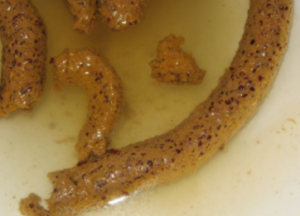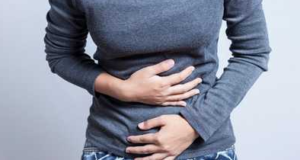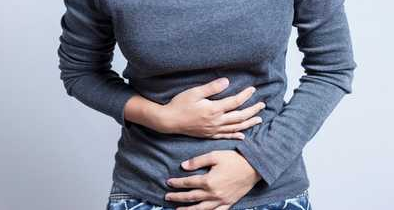What does it mean to have black dots, spots or specks in your stool? Most of the people who report such cases will always complain of abdominal pain, presence of blood and mucus in stool. What are the likely causes of this condition? The causes will range from parasitic infection to colon cancer. Read through for more information about the symptoms and the diagnosis.

Read also:
Black speck, dots or spots in stool meaning
Specks in stool will in most cases indicate something benign along the digestive track. For young people, these can be a possible symptom of inflammation of the colon, or a possible external or internal issue with the anus. The inflammation of the colon is not an indication that you are going to have colon cancer. You should have a doctor diagnose the condition to establish the actual cause of the bleeding.
Spots in stool could also mean you have gastritis. Gastritis is the inflammation of the stomach lining. The damage of the stomach lining is a common condition with an array of possible causes. The condition is said not to be serious, the symptoms will improve faster with time but can last for years without treatment.
Apart from speck inn stool, other symptoms will include indigestion, burning stomach pain, nausea and vomiting. Depending on how severe the erosion of the lining is, other symptoms will include pain, bleeding and stomach ulcers. Seek medical assistance if the above symptoms last for more than a week or two.
Specks in stool will also mean you have an intestinal infection, poor fat digestion or a bleeding digestive track. It could also indicate other underlying medical condition.
Black specks in stool abdominal pain
A big percentage of those who report of the cases of black spots in stool will also complain of abdominal pain. What then is the relation between the pain and the presence of the spots and dots in stool? A sharp pain on the left side of the abdomen can be said to be caused by the inflammation of the colon. This does not however mean you are going to have colon cancer.

Colon cancer is a malignant tumor arising from the intestinal lining. In the United States alone, it is the third leading type of cancer in males and the fourth in females. Risk factor for this condition will include colon polyps, long standing ulcerative colitis and genetic family history. Early stages of this condition will show no signs. That is why regular screening is very important. If diagnosed with cancer, surgery is the best treatment option.
Black specks in stool causes
Specks in stool can is common. The underlying cause of this pecks could range from the food we eat, the medicinal drugs we take to a complication in the intestinal track. Together with the black spots, some people will also have mucous and spots of blood. When this is the cases, you need to immediately have your health care provider diagnose the condition to establish the underlying cause.
Below we have complied a list of the possible causes we believe could be the cause of the speck. Remember the information provide should only provide an insight and not to be substituted for a professional diagnosis. They include the following.
Black Specks or Dots in Stool Causes – Video
Gastritis
Gastritis is said to be the inflammation of the intestinal lining. The condition can either be acute or chronic. Acute gastritis is the sudden inflammation of the linin whereas chronic gastritis s the long term inflammation and swelling of the lining. Chronic gastritis can last for years if left unchecked.
Another form of this condition-erosive gastritis, typically does not cause much inflammation but can lead to bleeding and ulcers in the lining of the stomach. These form is basically acute, manifested with bleeding but can also be subacute or chronic with few symptoms.
Gastritis is caused by a weak stomach lining the stomach. A thin or damaged stomach ling will also increase your chances of developing gastritis. The condition can also be caused by gastrointestinal bacterial infection. The most common bacterial infection is helicobacter pylori.
Other risk factors of gastritis that might to lead of specks in feces will include high alcohol consumption, routine use of non-steroidal anti-inflammatory drugs. Heavy drugs like cocaine and age as the lining will thin and weaken naturally. Stress, auto immune disorder, digestive disorder and viral infection are the less common cause of the stomach lining erosion.
Once the condition is diagnosed and the underlying cause of the erosion established, your doctor can then prescribe the medication depending on these underlying cause. For erosion caused by intake of steroidal anti-inflammatory, avoiding the drug could help relieve some of the symptoms. If on the other hand the cause is bacterial infection (H. Pylori) then routine treatment with antibacterial will help kill the bacteria. These are not the only medicinal treatment available. Have your health care provider tell you more.
Intestinal infection
Gastrointestinal infection can be viral, bacterial, or parasitic infection that can result in the damage and inflammation of the stomach lining. Common symptoms will include diarrhea, vomiting and abdominal pains. For children and some adults, blood or black spots may also be seen in stool.
To prevent intestinal infection, you will need to practice good hygiene, this includes cleaning your hands regularly, and you can also get vaccinated against certain viral infection that might led to this kind of damages.
Liver or gallbladder damage?
Bile juice produced by the liver is the secretion responsible for the yellow-brownish color of normal stool. Bile is vital in the digestion of fat in our diet. A discoloration in the stool or presence of specks will indicate a possible problem with your liver. Have a doctor diagnose the condition to known what is actually happening.
For some people, the symptoms will be present but after diagnosis, the liver is found to be functioning properly. Then at this point, it is not the liver that is the cause but the gallbladder. A gallbladder diseases such as cholecystitis may lead to difficulties in releasing sufficient amount. The disease cause the secretion of insufficient amounts of bile.
Now how do you know what the cause of the problem is, the liver or the gallbladder? To do that, you will have to look at other possible symptoms then your health care provider will help you establish the actual cause of the colored specks in stool.
Lactose intolerance
Lactose intolerance is not the same thing as a food allergy to milk or other dairy products. Lactose intolerance means the body cannot easily digest lactose- a type of natural sugar found in milk and dairy products.
With this condition, the product will come out of the body in the same form and color they were ingested in. When lactose moves through the colon, without being properly digested, it is known to cause uncomfortable symptoms such as gas, belly pain and bloating. The condition occurs when the small intestine are unable to secret an enzyme known as lactase that breaks down too digest lactose.
Lactose intolerance is common in adults. The biggest challenge of those with this condition is learning how to eat to avoid discomfort and get enough calcium for healthy bones. A professional nutritionist will help you come up with the right balance.
Food you consume
Foods and drinks we consume might also cause colored spots to appear in stool. Black pepper, banana, spinach, blueberries, plums, legumes, bees, fig and raw undercooked meat are just but an example of these foods.
Medicinal drugs
Drugs used to treat different medical condition might end up causing complications in the digestion system caused the appearance of colored specks in your stool. This will include drugs such as aspirin and ibuprofen.
That is why it is always recommended to have a doctor prescribe the drugs instead of taking over the counter medication. This with drug allergies or any other form of allergy are the most affected with these complications.
Bacterial infection
Bacterial infection occurring due to intake of contaminated foods, water and beverages might also end up causing the erosion of the intestinal lining or poor digestion. Undigested foods or poorly digested food for example due to lack of bile or other digestion enzymes might end up causing these kind of colored spots in stool.
A good example is the presence of white specks in the stool of people with liver or gallbladder complication. This is due to lack of bile which is responsible for the digestion of fat. If these people ingest fat, then it will appear as specks in stool.
Hot pepper in meal
Colored specks can also be caused by taking a lot of hot pepper. Other spicy and foods such as watermelon, and ball pepper might show up as red speck in stool if not well digested. Some people will also have the specks due to rectal bleeding especially hemorrhoids.
Iron deficiency
According to the U.S National Library of Medicine, iron supplements prescribe for people with anemia-a blood condition marked with low levels of iron. Anemia is said to cause tiredness, shortness in breath and pale skin.
While iron supplements might help boost the levels of red blood cells, a common side effects is the presences of back specks in stool.
Bleeding digestive track
A bleeding digestive track is a possible sign of a problem and not a problem in its own. The bleeding occurs due to a condition that can be cured or controlled. The cause of the bleeding might not be serious but it is important to have a doctor check the condition out.
The digestive track or the gastrointestinal track include the esophagus, the stomach, small intestine, colon, rectum and anus. The bleeding causing the colored specks in stool can came from any of these areas. Common cause of bleeding would include an ulcer on the stomach lining or an inflammation of the colon.
Parasitic infection
Intestinal parasites can either be one cell organism or intestinal worms that feed on stool or blood from the intestinal walls. These parasites are shed in human or animal stool. Apart from colored specks in stool, common symptoms of parasitic infection will include mild diarrhea, mucous in bowel, bloating, and an explained weight loss.
Maintain good hygiene by ensuring clear disposal of stool and other dirt.
Black speck in stool cancer
In the United States, colon cancer is said to be the third leading type of cancer in males and the fourth in females. Also referred to as bowel cancer, it is the cancer that starts in the rectum or the colon. It is a malignant tumor arising from the inner walls of the large intestine.
With bowel cancer, you are likely to experience persistent change in your bowel habits, this can be showed by persistent loose stool. People with this condition also complain of abdominal pain, bloating and discomfort. Sing it is common during old age, it may also be accompanied by loss of appetite, or significant weight loss.
Colon cancer can be caused by:
- Age, common in people around 60 years
- Overweight with no regular exercises
- Diet high in red or processed meat and low in fiber
- Excessive smoking and alcohol
- Genetics, those with family history of this type of cancer
Black specks in stool parasites
Intestinal parasite can be of two type, this is according to a research by the university of Maryland medical center. The two main type of these intestinal parasites are helminths and protozoa. Helminths are worms with many cells, this include tapeworms, pinworms and round worms. Protozoa on the other hand are have only one cell.
Protozoa can multiply in the human body, allowing the development of serious infection. Intestinal parasites as mentioned earlier are transmitted when a person comes in contact with infected feces. The most common protozoa in U.S are giardia and cryptosporidium.
Most of parasite living in the body might fail to show signs or any clear symptoms, when they do, they would include the following: abdominal pain, diarrhea, vomiting, bloating, rash or itching around anus, unexplained weight loss or colored specks in stool.
When diagnosed with intestinal parasite, the treatment option will include drug therapy where your doctor will have to prescribe medicinal drug depending on how severe the intestinal parasites are. The doctor might also prescribe diet changes and nutritional supplements. For mild asymptomatic parasitic attack, herbs and natural remedies can be used to relieve the symptoms at home.
Be on the watch out for the following, they can be said to be the red flag of a parasitic infection
- Chronic digestive issues
- Various form of mental distress such as depression, body aches, headaches and behavioral changes
- Autoimmune disorders.
Black specks in stool blood
Blood in stool can be very scaring. It signals a possible bleeding along the intestinal track. Whereas it signals a serious condition, that is not always the case. The amount of blood may be too small that it can only by detected by a fecal occult. Sometimes it may be visible in the toilet tissue or after a bowel movement.
Black and terry stool is caused by bleeding that happens higher up in the digestive track. The possible cause of blood in stool will include the following:
- Diverticular disease, this are small pouches that project from the colon wall. These pouches do not cause problems but they can bleed or become infected.
- Angiodysplasia, a condition in which fragile, abdominal blood vessels lead to bleeding
- Polyps or cancer are benign growths that grows, bleed and become cancerous.
- Esophageal problems
- Anal fissure, are small cut or tear in the tissue lining he anus. They can be painful and bleed and are caused by passing large, hard stool.
Little, tiny or small black specks in stool diarrhea
Diarrhea is a condition where feces are discharged from the bowel frequently and in liquid form. Diarrhea can range from being a mild condition to a life threating one. There are four condition which can cause diarrhea, they are osmotic diarrhea which occurs when the small intestine cannot absorb soluble compound and fluids is drawn into the gut, secretory diarrhea that result from active chloride secretion in the body, inflammation of the intestinal lining and when the motility of the intestines is increased
Little, tiny or small black colored speck in stool during diarrhea can be as a result of parasitic, bacterial or virus contacted from infected environment or poor hygiene. In the US, the most commonly identified causes of diarrhea are the bacteria salmonella, Campylobacter, Shigella and Shiga toxin-producing Escherichia coli.
Hard black specks in stool
The color and texture not forgetting the smell of your stool says a lot about your general health. The color and contents of the poop will depend on the foods we eat, the general condition of the gastrointestinal lining and whether or not you have bleeding or ulcers in the intestinal track.
Hard spots or dots on stool can be a possible sign of bleeding along your intestinal track. Undigested foods like fruits seeds and others might show up in your stool as hard specks. If the specks are consistent, it is important to have your health care provider run some diagnosis to establish the underlying cause of this spots.
Large black spots in stool
As said, the color, texture and smell of your poop is in most cases determined by what you eat. The color of the poop will range from brown, yellow, green, white or black or dark. For the texture, the poop may be hard, soft or watery. It is also possible to have large black spots in stool caused by bacterial infections, color cancer or simply the food you eat.
If the large black spots persist, or other symptoms start to appear, then you need to see you doctor as soon as possible.
Treatment for Black spots, dots or specks in stool
The treatment for the condition will vary depending on the underlying cause of the specks inn stool. For bacterial infections, antibiotics should be used, if the underlying cause is inflammation or swelling along the gastrointestinal lining, then corticosteroids, immune system suppressive or anti-spasmodic drugs can be used.
If you are diagnosed with colon cancer, the treatment will range from removing the polyps during a colonoscopy or laparoscopic surgery. For liver damage, treatment will include hydration treatment and surgery to remove gallstones or clear obstructions. Seek medical attention for effective treatment.
Sources and references
- http://realhealthvision.com/white-and-black-specks-in-stool.html
- http://medmum.com/black-dots-in-stool/
- http://doctordecides.com/black-specks-in-stool/
- http://www.wowremedies.com/black-specks-in-stool/


